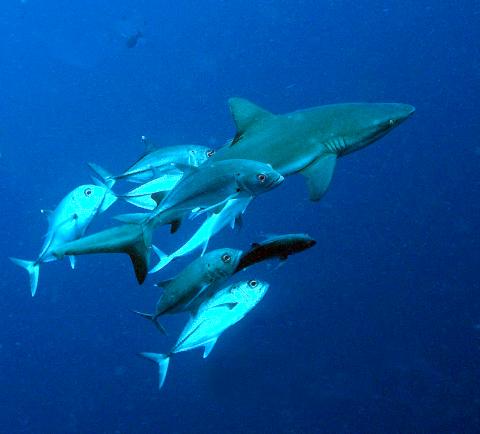Sharks can be worth far more when they are swimming around the reef than when they are in a bowl of soup — as much as nearly US$2 million each, in fact, according to the results of a study released on Monday.
For the study, researchers from the Australian Institute of Marine Science considered the expenditures of divers who travel from around the world to the tiny Pacific nation of Palau to dive with the mainly gray reef and reef whitetip sharks that inhabit its waters, which were declared a shark sanctuary in 2009.
As a remote country of more than 300 islands — Manila, more than 800km away, is the closest city of consequence — Palau does not have many attractions beyond diving, so spending by international tourists on airfare, lodging and diving makes up an important part of the nation’s economy.

Photo: AFP
The economic logic is straightforward: Diver tourism contributes about 39 percent of the country’s GDP of US$218 million, and 21 percent of divers chose their vacation there specifically to see the sharks, meaning that tourism to view sharks contributes about 8 percent of GDP, the study said. The researchers concluded that the roughly 100 sharks that inhabit the prime dive sites were each worth US$179,000 annually to the island nation’s tourism industry, and that each shark had a lifetime value of US$1.9 million.
Sold in pieces for their fins and meat, those same 100 sharks would be worth only about US$10,800 total, the researchers estimated.
“It clearly indicates that no matter how you slice it, that a shark is worth more in the water than the sum of its parts when it’s cut up and sold,” said Matt Rand, director of global shark conservation at the Pew Environment Group, which financed the study.
The Australian researchers were not the first to reach this conclusion, but they found individual sharks to have a much higher value than previous studies did. A study conducted in the Maldives had found the sharks to be worth US$33,500 each to the government of that country. The Bahamas, cognizant of the tourism draw, bills itself as the “Shark Diving Capital of The World.”
Millions of sharks are killed each year for their fins or as bycatch, but there has been halting political progress toward reducing the pressure, like the creation of Palau’s shark sanctuary, the world’s first.
Just a few years earlier, Palau had been considering opening a shark fishery with the aim of exporting fins.
Local residents now gain an estimated US$1.2 million annually from the shark-diving trade, the researchers found, while the government reaps about US$1.5 million.
With warm clear seas and World War II wrecks, Palau is a special place, of course. Mark Keegan, principal research scientist at the Australian Institute of Marine Science and the lead researcher for the study, said in an interview that the same economics might not apply to sharks in, say, the cold waters of the North Atlantic.
Still, there is a strong argument that sharks are an economically valuable part of the ecosystem, he said, noting that the Chesapeake Bay scallop industry was devastated in recent years by a proliferation of cownose rays caused partly by the overfishing of the rays’ main predators, which include hammerheads and other sharks.
Sharks grow slowly and give birth to few young, Rand said.
“Once they lose these species, they won’t recover like other fish,” he said, adding that quick action was therefore needed by governments.
“Fishermen see sharks as a commodity,” Keegan said. “We see them as an important part of the ecosystem. That’s a very hard argument to make to them. But make an economic argument, that it’s worth more letting people look at it than it is taking it, that’s something they can understand.”
The idea is catching on. The Maldives has declared itself a shark sanctuary, and tourism operators and conservationists in Fiji, the Bahamas and other dive destinations are now calling for shark protections.

STEPPING UP: Diminished US polar science presence mean opportunities for the UK and other countries, although China or Russia might also fill that gap, a researcher said The UK’s flagship polar research vessel is to head to Antarctica next week to help advance dozens of climate change-linked science projects, as Western nations spearhead studies there while the US withdraws. The RRS Sir David Attenborough, a state-of-the-art ship named after the renowned British naturalist, would aid research on everything from “hunting underwater tsunamis” to tracking glacier melt and whale populations. Operated by the British Antarctic Survey (BAS), the country’s polar research institute, the 15,000-tonne icebreaker — boasting a helipad, and various laboratories and gadgetry — is pivotal to the UK’s efforts to assess climate change’s impact there. “The saying goes

Police in China detained dozens of pastors of one of its largest underground churches over the weekend, a church spokesperson and relatives said, in the biggest crackdown on Christians since 2018. The detentions, which come amid renewed China-US tensions after Beijing dramatically expanded rare earth export controls last week, drew condemnation from US Secretary of State Marco Rubio, who on Sunday called for the immediate release of the pastors. Pastor Jin Mingri (金明日), founder of Zion Church, an unofficial “house church” not sanctioned by the Chinese government, was detained at his home in the southern city of Beihai on Friday evening, said

TICKING CLOCK: A path to a budget agreement was still possible, the president’s office said, as a debate on reversing an increase of the pension age carries on French President Emmanuel Macron yesterday was racing to find a new prime minister within a two-day deadline after the resignation of outgoing French Prime Minister Sebastien Lecornu tipped the country deeper into political crisis. The presidency late on Wednesday said that Macron would name a new prime minister within 48 hours, indicating that the appointment would come by this evening at the latest. Lecornu told French television in an interview that he expected a new prime minister to be named — rather than early legislative elections or Macron’s resignation — to resolve the crisis. The developments were the latest twists in three tumultuous

FIRST STAGE: Hamas has agreed to release 48 Israeli hostages in exchange for 250 ‘national security prisoners’ as well as 1,700 Gazans, but has resisted calls to disarm Israel plans to destroy what remains of Hamas’ network of tunnels under Gaza, working with US approval after its hostages are freed, it said yesterday. Israeli Minister of Defense Israel Katz said that the operation would be conducted under an “international mechanism” led by the US. “Israel’s great challenge after the hostage release phase will be the destruction of all Hamas terrorist tunnels in Gaza,” Katz said. “I have ordered the army to prepare to carry out this mission,” he added. Hamas operates a network of tunnels under Gaza, allowing its fighters to operate out of sight of Israeli reconnaissance. Some have passed under